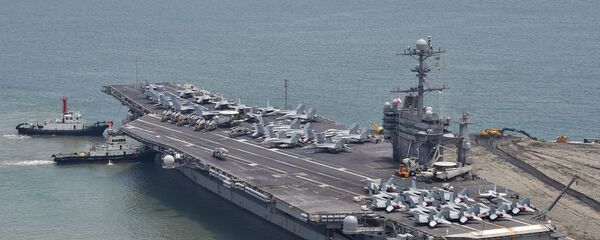Last week, Politico reported on the dilapidated state of the US Army's Italy-based 173rd Airborne Brigade, citing an internal analysis obtained by the news website. The report revealed that the brigade lacks key capabilities essential for the efficient implementation of its mission. Deficiencies include the lack of efficient air defense, outdated electronic warfare systems, the lack of sufficient camouflage netting for vehicles, and other problems.
Speaking to Sputnik, British-Serbian political commentator Marko Gasic explained that the report didn't reveal anything NATO or Moscow didn't already know, namely, that the Rapid Reaction Force is a token force, deployed for political and geopolitical purposes, rather than military ones.
"The Rapid Reaction Force, or the 173rd Airborne Brigade as it's referred to in the report, is in this theater of potential conflict as a kind of signal of reassurance more to America's European allies of US engagement to NATO in Eastern Europe than anything else," the observer said. "But both NATO and Russia understand that the force is a token one. It's more a signal than a real war-fighting force."
"They know that the US has flagged up this force very much to Europe as a sign of its sincerity and commitment to its allies, and those who are spinning the story are using [this], hoping to make the Rapid Reaction Force into a talisman by which Europe can measure the reality of US support. If they succeed, the US will be forced to properly support its own unit to placate the Europeans."
"That's why I think they leaked this report to an EU audience through an EU portal, trying to create a situation where the Europeans themselves will be marketing this US unit to Washington's political and military decision makers," the expert added.
As far as the details of the report were concerned, including the apparent lack of modern air defense and electronic warfare equipment, Gasic explained that it all comes down to the Pentagon's calculations about the nature of modern warfare.
"This would be a situation where they don't imagine that a conflict with Russia will be decided by infantry power at all; that's why they're not paying attention to resourcing this symbolic unit. But there's no reason to doubt that the US Army, with its $600 billion+ annual budget, has the capabilities that this particular unit is lacking. I think this unit is pleading for survival – it's claiming relevance in the new military story, whereas the Pentagon really is less reliant on classic infantry in this region, and it wouldn't want to rely on the Rapid Reaction Force any more than it would a cavalry regiment, or some other antiquated force for the particular theater that they're in."
Accordingly, the observer quipped that based on this leaked report, "we can probably conclude from the treatment of this particular unit that there's no immediate plans to invade Russia [using] infantry. It's really about the changing nature of war that we're seeing here. I think this is just a little spin by those who are losing out as a result. It could be their command structure, it could be similar units. But that entire military area is groaning at the lack of support, and trying to do something about it."
Asked what the Pentagon's next steps might be, Gasic noted that "unless the leakers of this report succeed in getting the Europeans concerned and complaining to their partners in the Pentagon, the revelation won't [mean] anything. The Pentagon will carry on replacing what it considers to be 20th century tactics with what it considers to be those fit for the 21st century."
As for the real and continued buildup of NATO forces on Russia's borders, particularly in the Baltic area, the observer noted that this was based on the rules established by the current world order. "NATO is built on the work or activity of the military industrial complex, and an atmosphere of permanent crisis internationally suits their need for a permanent demand to ensure security," Gasic concluded.





